I left trails of white flakes
I had very severe psoriasis at the time and left trails of white flakes of skin wherever I went. It was quite embarrassing. But the worst thing was the itching. When I got dressed I would scratch myself all over my body until the skin was raw and started bleeding. That was pretty much a normal part of my daily routine.
My psoriasis wasn’t actually a problem at school to start off with. But then things got worse as I grew older, and I had trouble concentrating. My grades got worse then too. That was partly due to problems in my family. But I remember that the itching really distracted me from my schoolwork. It was particularly bad when I had to study for exams.

